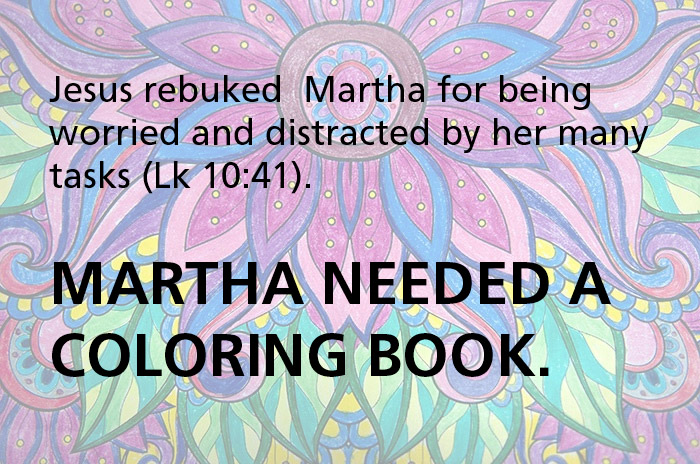I often give lectures at retreats on Christian spiritual formation attended by church goers and pastors—all people hoping to grow in their faithfulness as disciples of Jesus.
At every retreat a few people—often sitting next to the women in the back knitting—will be bent over their desks with intricate mandalas in front of them and a rainbow of colored pencils spilled on the desktop. They are listening to me and they are coloring.
Also at these retreats, as I walk around during the silent times—times devoted for reflection and prayer—I will without fail spy a few people outside nestled against a tree trunk or on a bench, crayons in hand, coloring books opened on their laps.
When I see these folks I do not say to myself: “Oh, look at these poor souls duped into thinking this new fad will make them better Christians. Why don’t they engage a real spiritual practice like praying or reading Scripture? The next thing you know they’ll be walking the labyrinth!”
No, I give thanks that they are discovering a way of prayer their churches never taught them, but that is helping them listen to God and be present to others.
And when I walk into Barnes & Noble and see the cheap coloring books for grown-ups on sale at the front of the store and the expensive designer ones in the back, I only hope that more Christians might discover this practice and deepen their lives with God.
Here’s why.
A great epidemic in our culture is anxiety. One insidious aspect of anxiety is the way it isolates by turning you in on yourself. Captive to the frantic, catastrophizing thoughts in your mind, you become inaccessible to others—present physically perhaps, but in no way truly available.
But disciples of Christ seek to be increasingly available to God and compassionate to their neighbors. Anxiety can prevent this.
This might be why we so often hear in Scripture, from both angels and Jesus, “Do not be afraid,” why Jesus told us not to worry about tomorrow, why the Apostle Paul tells us to be “anxious for nothing”—they know how distracting anxiety and worry can be, how isolating. How the white noise of anxiety can keep us from hearing the voice of God and seeing the needs of our neighbors.
Just a few minutes ago I returned from my seminary’s chapel service at which someone read Jesus’ rebuke of Martha for being worried and distracted by her many tasks (Lk 10:41). She was incapable of the one thing needful—attending in a focused way to Jesus.
Do you know what Martha needs? A coloring book.
When these people on retreat are coloring a picture, they are finding that this practice of attention quiets their minds; it turns down the white noise that isolates them from God and others. This kind of coloring—done not frantically or with the goal of coloring the most beautiful picture, but slowly and attentively—is one form of mindfulness practice. And the literature around the benefits of mindfulness for anxiety mounts daily it seems.
Mindfulness is not uniquely Christian; neither is coloring. But we worry too much about these things. I have no doubt that some people pray better—or prepare to pray better—clenching a crayon. They are figuring out what it means not to worry about tomorrow or be anxious for anything as their hand glides across the page.
One night when I was away I called home and asked my wife what she and the kids were doing. She had recently bought one of the on-sale coloring books, and she and our young daughter, Mary Clare, were at the table coloring together. They’d been there for almost half an hour. No chatter. No distractions. Just peaceful coloring.
But if one of them needed to have an important conversation with the other or with God, I suspect that would have been a ripe moment for it. For neither was distracted or worried by her many tasks.
Next up—teaching our daughter to walk a labyrinth.
The Rev. Dr. L. Roger Owens is associate professor of leadership and ministry at Pittsburgh Theological Seminary and teaches courses in the MDiv, Doctor of Ministry, and Continuing Education programs. Before coming to PTS he served urban and rural churches for eight years in North Carolina as co-pastor with his wife Ginger. He has written multiple books including The Shape of Participation: A Theology of Church Practices which was called “this decades best work in ecclesiology” by The Christian Century.


Enjoyed reading this, very good stuff, thankyou . “All things are difficult before they are easy.” by John Norley.
I really appreciate this, as I’ve seen huge differences in how Christians view the practice of coloring. I am always surprised when people feel that coloring is contrary to their religious beliefs. Some of the most devoted people I’ve ever know I’ve met through coloring groups, both online and offline. I feel like anything that helps you connect to your beliefs without should be celebrated, especially when it doesn’t negatively affect anyone or anything surrounding you.
Thank you for the detailed review on the books and different mediums! I have a few of the books, but have only used pencils or sharpies on them so far.
It’s amazing to visit this website and reading the views of all colleagues about this post,
while I am also eager of getting knowledge.